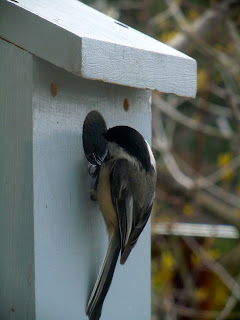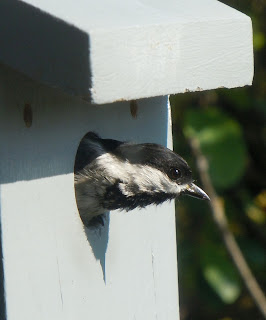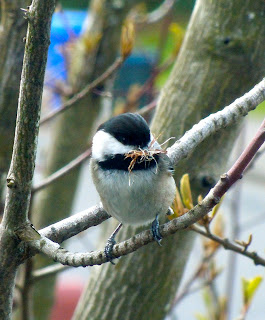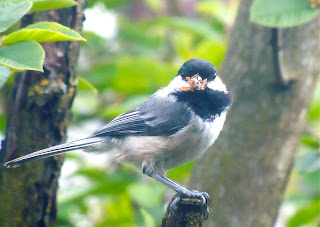 |
| Studley (or Marge) |
It’s possible you don’t care about our chickadees, Studley and Marge, but that seems so unlikely, I’ll tell you about them anyway. Our chickadees are in the chickadee manufacturing industry, and they’ve set up shop in the house Dave built for them and hung outside my writing room window. The first year we followed their progress avidly. Nothing against Dave’s carpentry skills, but neither one of us really expected to achieve chickadees just by putting out a house with the right size hole. So we were thrilled. Chickadees are interchangeable, not that we don’t think ours are special. No matter where we are, if we hear chickadees going off, Dave will ask if those are our chickadees. And I’ll examine them, for some reason, and then say yes. Why not? They don’t any of them veer off the template much.
Last year things didn’t go well. They showed up on schedule and moved in the bassinet and took turns popping in and out, but we never heard any peeping and no one ever brought in grubs. When we were absolutely sure we wouldn’t mess things up for anybody–around Christmas–Dave took a look inside and found some punctured eggs. We were very sad and hoped this year they wouldn’t have moved to a better neighborhood. But they didn’t. They scouted it out in March and started moving stuff in toward the end of April. By May two chickadees were definitely living in the box. One would stay in and the other would go for take-out.
I watched them, five feet away, while I got ready to write a novel. When the chickadees were bringing in mattress material, I was rounding up research books, notes, and sources. When the chickadees were taking turns settin’, I sketched out my opening scenes. I wrote my first page, and the chickadees began blasting in and out of the house with bugs and grubs, indicating, to my fine detective mind, that it was really hungry in there. I tried hard to tell them apart. After a while I persuaded myself that one of them was a little sleeker than the other, though the difference was like shaving dimples off a golf ball.
Chickadee puppies should fledge and fly away about sixteen days from hatching. And this time I was going to see it, because I was spending so much time in that chair. Would they arrow through the canopy and stick their landings like mom and dad? Or blast out like plumb-bobs? Did I need to string up a net?
I wrote 4200 words, bringing me to a crucial early juncture. Scrub jays showed up at the suet feeder and the chickadees gave them what-for, pelting them with dee-dee-dees until, after five minutes or so, they fell bloated off the suet. I clicked on something on my screen and my 4200 words disappeared. The chickadees hurled in grubs, and I sent my neurons in after my lost novel. The hungry box began peeping like it was full of hamster secrets. I got back up to 6,000 words.
Now they’re fast and furious. The chickadees had a flappity-flap signaling system to prevent them from banging into each other at the entrance. You first. No, you. I got a purchase on my second scene and hammered my way toward 9,000 words. The peeping inside the box began to sharpen up, genuine dees without the chicka. I anticipated fledging day on Friday the 8th of June. But that day the grubs kept coming; one of the parents was now augmenting the menu with bug-and-suet sandwiches. By twilight my novel may as well have been rolling off God’s fax machine. I was up to 13,800 words, one for every grub that had been poked into that hole. And still no fledglings had come out.
I finished the first two major scenes in my novel and didn’t know exactly how to approach the next part. I sat down the next day and stared out the window. The chickadees were gone. I don’t know if they all flew out when I was farting around on Facebook or what. They were gone. And my screen was blank. And I thought the same exact thought you all are having right now: shit. I just wrote myself into an O. Henry story.
 |
| Marge (or Studley) |
O. Henry made a mean candy bar but he was responsible for ruining fiction for me for decades. I loved his stuff when I was a kid. Everything I wrote was a clumsy imitation of him, with the boffo ending, everything turning on the last line, which was always strenuously ironic. The wife sells her hair to buy a fob for her dear husband’s prized watch. He sells his watch to buy a comb for her beautiful hair. Theirs was the best fucking Christmas ever, because they had love. Bite me. Or, the feeble woman convinces herself she would die when the last leaf falls from the vine. The artist paints his masterpiece, a leaf that never falls, and she thinks better of her dramatic demise and recovers, while he catches pneumonia from painting en plein very cold air and dies. When an O. Henry story ends, ain’t nobody confused about it. Bang the cymbals. It’s over.
That, I thought, was the way a short story should be. But modern short stories aren’t like that. They may turn on the last line, but it might be just a slight turn, more like a facial tic. I keep flipping the page, wondering where the rest of the story is. They peter out. That’s what they do. It would be like if I wrote a blog post and it just sort of, you know, whatever.
But this may not be the end of my story, or my novel. Chickadees sometimes get enough gumption to haul in a new mattress and start a second brood. That’s what I hear. So I’ve got my eyes peeled for Round Two. If one of my birds comes back with a glint in his eye and a furniture jones, I’m back in business.


Isn't it amazing how they just fire into that little opening like a bullet from a gun? They never miss and crack their little bone heads (which I would be sure to do).
I can't figure out how they don't smash into the back of the box. At least I now know why we were supposed to put in a certain "drop" under the hole. They'd nail those young 'uns for sure, coming in.
So we don't know if the chicks were somebody's lunch or just left? I love my chickadees but I don't see them at home, not having thought of building a little house like that. Your novel is coming along, it seems! BTW, love your pictures on Facebook…
I'm sure they're fine. Fine without my supervision. It's hard to admit, but it's true. Studley and Marge have been back and poking their heads in the hole, but I don't know if they're just deciding to make it a rental or plan on doing it ALL OVER AGAIN this year.
Once they stop nesting, they leave the nest for good. So if they're still poking around, it means they're at least considering a second brood. Good luck!
Hooray for the novel and hooray for the chickadees! Your cat looks so very well entertained.
There are novels that sort of end with, "And then everyone was run over by a bus. The end." Novels like, "Congo", "The Deep" and everything else Criton wrote. I far prefer O'Henry.
Wow. That would be a great ending for my book. [scribbles "bus?" in outline notes]
I prefer the O. Henry ending. I'm a little slow and need it spelled out a bit. 🙂
Loved this.
See, me too. I'm only just getting over having to have things spelled out for me.
I can't even IMAGINE writing a novel. I'm not good at making stuff up. The bright side to that is that people can be certain that everything on my blog is true.
Oh dear! You write about vomit!
Hope the word count keeps going up despite your chickadee-less state. Maybe you could try stuffing some grubs into your keyboard. 🙂
The gremlins in my computer would eat them.
You can't be blamed for being so deep in novel thought that you miss the baby bullet chickadee explosion. Better luck next time. Too bad the cat can't run a camera. I bet he/she saw the whole thing–LOL! 😉
I wasn't even there. Dave got up earlier and said the chickadees were still bringing in meals in the morning, and by 11am when I finally sat down there was nothing. I squandered the whole thing on coffee, the paper, the cat, and Facebook.
When we lived in the country, we had Robins, Tree Swallows, and Yellow Warblers nesting at our place. At our home in the city, House Wrens and Red-breasted Nuthatches. At our den in the trees, we can hardly see birds, let alone know if they are nesting. Except for the pigeons.
Oh, you don't want pigeons nesting at your den. They are not tidy fecal-sac transportation experts, and you can quote me on that.
Those little beggars sure to whip in and out of that box. Too bad you missed the little ones leaving but if they left at the speed their parents fly you would have had to have a fast camera running 24/7 to catch them.
Looking forward to the novel. Agree about O Henry.
I've never seen anything take its first flight, except wood ducklings, and that's more of a plummet.
Last year's eggs may have been punctured by a wren. They appear cute and harmless but love to destroy other species' nests.
Julie Z thought so too. She said bluebirds do that, but I reminded her that they don't do it in Portland, and she amended it to wrens. Now that both of you are agreeing, I'm calling it. Wrens. They're so dang cute, too.
I loved every moment of this piece. Your chickadees are wonderful! Damn, they've got good aim. It's a good thing they don't stop off on a beer on the way home. They'd smash right into the side of their house. I feel the same enchantment with hummingbirds. Congrats on all those words. I very much looking forward to reading your novel, my witty, talented friend.
We got an influx of baby starlings and boy did they look like they'd stopped in for a beer. Bonking (harmlessly) off my window, landing on the chickadee house, peeing in the bushes, talking too loud…
As usual, a totally delightful read, Murr. (As you probably suspect, I enjoy reading ANYTHING about birds but that is only part of why I loved this post so much.) You are whetting my appetite for that novel, for sure!
I always encourage people to keep it whet.
Not with a bang, but a whimper.
Bang comes first, then the whimper.
If you have a feeder they may bring the chicks to it. We had a lot of birds nesting around our house, but only saw one nest (robins) but currently have seen around the feeder
Mourning dove pair with juvenile
Northern Cardinal Pair with juvenile (and he's pink)
Robins with multiple juveniles (at least 2 possible 3)
House Finch pair with juvenile
multiple House Sparrows with juveniles
and a gaggle of starling juveniles.
SO keep an eye out for smaller chickadees at your feeder
Who was it? Was it Sharon? Who said the finches were so lazy they just picked up the kids and dumped them in the bird feeder to feed themselves. Their nest-building is pretty spare and raunchy, too. That's the kind of mommy I would have been. Surround the kid with pillows and toss in Doritos.
That's definitely Marge looking out the door. Studly is likely on the couch watching reruns. Or was Marge the boy chickadee? My memory is at the point where I know there was something to remember but can't figure out what.
Love this post, twitchy cat and all, and I'm very curious about your book. Good luck making progress!
And to add insult to insult I've gone and misspelled Studley's name …
Studley can't even spell his own name. He thinks he's all that because of his flying abilities but he sucks at Scrabble.
OH, I remember the story of the girl saying she would die when the last leaf fell from the tree out the window. That artist painted a masterpiece. I seem to remember a film being made of that story!! It made me cry.
So…what is your book about????
Zombies.
This comment has been removed by the author.
My claim to fame is that I live in the city where William Sydney Porter (aka O. Henry) was born and grew up in, so we have the surfeit of O.Henry stuff here including magazine, festival, chapbook, etc. Woo hoo.
Occasionally I'll let Joe out on the patio (supervised and I do have a privacy fence completely surrounding it) to just hang out and sunbathe. I have a grey catbird couple nesting in my redbud tree and they started to dive bomb my poor cat. The look on his face was priceless as he couldn't figure out what the hell was going on. After all, he has spent all of his 15 years as an inside-only cat (yes, I agree totally with Julie Z. on that) and just in the past six months has been allowed to venture out. I don't think he has a clue as to what a bird is. He certainly doesn't react like Tater does.
Sorry for the above deletion. I must have hit the publish button too many times.
My first cat, (Saint) Larry, did not go outside until she was fifteen. By then we easily kept her on the patio by going "ah-ah-aaah" when she stuck her nose over the edge, and she'd draw right back. She was good company on the patio.
Hey Murr! Like Chantel, I like the explained endings. And, like Suburban Correspondent, I can at least say with a straight face that everything in my blog is true. Fingers crossed for the book, and, like, whatever. Oh yeah. Birds. Sweet. Roth
Hey Roth! You can SAY everything in your blog is true, but sometimes, my dear, it's a special kind of true. Innit?
Nice to be back. I thought I'd seen something on FB about the dog eating your novel, poor baby, but it sounds like you recovered nicely.
I grew up in Greensboro, home of O'Henry, and went to William Sydney Porter Elementary (O'Henry's real name). We were all deeply steeped in his style to the point that, when something kinda like an O'Henry story happens in real life, we can't write about it. We're embarrassed by the type-casting. We get blogstipation trying to figure out how to write it so it doesn't come out like a copycat O'Henry story. It's ironic, isn't it?
Now I'll be reading all day, trying to take in all the backstory I've missed. Love ya, Murr. Nice animal actors.
There's got to be a good story about the irony of trying not to write an O. Henry story. Hey, Nance, welcome back, darlin'! Yuh, I recovered all but 500 words of the novel by scooping out my own brain pan, and I figured the rest would show up, but they didn't. Possibly they were less than necessary.
Make that "O. Henry." I'm s'posed to know that, ain't I?
You is.
I honestly didn't know you could 'birdhouse' chickadees. I've only done it with swallows. Both fascinating and delightful with all your brilliant wit.
Here's a plan.
Ever vigilant watching the little torpedos! Too bad Dave didn't make the side facing you from plexiglass. Would that be like a 'peep show'?? lol
He is begging me to let him make that out of plexiglass. I would love that too but somehow I think the chickadees would not. I would be happy to stand corrected. I really want to watch them crash in there on top of all those birdies.
In third grade, every single "story" I wrote in Mrs. Plunkett's class ended up with "Well, I think I hear my mother calling, so I have to go before I end this tale." She kindly pulled me aside to encourage me to do something more creative. I don't know what I did after that. I was lost without that line.
Try it again now. You can end a story any old where.
Ha I know the feeling. I missed the hatching of goslings from the eggs I'd watched over for more than a month. Thankfully, my son's girlfriend found them for me and snapped a few shots while I was out of town. Your chickadee tale is a delight and a hoot. I hope they return for round two.
They sit on eggs for a MONTH? Remember that New Yorker cartoon of the bald eagle yelling at its chick? "Listen, mister, I didn't sit on your hard egg for three weeks in the blazing sun to hear you say, 'ew, I don't LIKE regurgitated yak meat!'"
a wonderful post! well-deserved POTW!
Love the ending. the cat's tail has a story too.